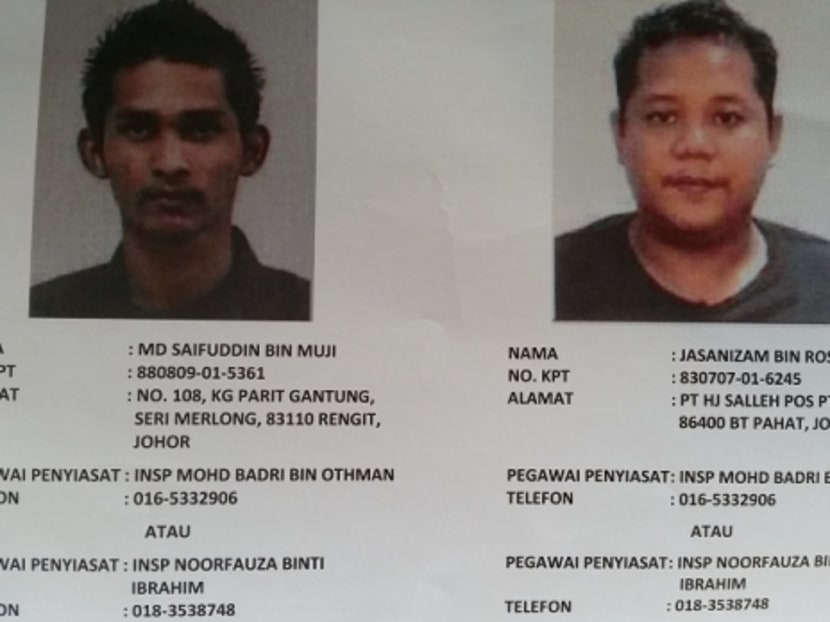Malaysia confirms IS was behind Selangor club attack
KUALA LUMPUR — Last week’s grenade attack on a nightclub in Selangor is the first successful Islamic State (IS) attack in the country, Malaysia police have confirmed, marking a breakthrough by the terror group after numerous plots were previously thwarted by Malaysian authorities.

Mugshots and details of the two men wanted by police in connection with the grenade attack on the Movida nightclub.Photo: Malay Mail Online
KUALA LUMPUR — Last week’s grenade attack on a nightclub in Selangor is the first successful Islamic State (IS) attack in the country, Malaysia police have confirmed, marking a breakthrough by the terror group after numerous plots were previously thwarted by Malaysian authorities.
Police chief Khalid Abu Bakar warned on Monday (July 4) that the attack, which injured eight people, was the first step in a series of planned attacks by the militant group. He said the attack was carried out by locals under the instruction of Muhammad Wanndy Mohamed Jedi, a known Malaysian IS recruiter based in Syria.
The breakthrough came after police arrested 15 suspects believed to be involved in terrorist-related activities in a string of operations in Kedah, Selangor, Kuala Lumpur, Malacca and Penang following the nightclub incident on June 28. Several sharp weapons as well as IS flags and ideology materials were seized during the raids.
The arrests included two male suspects who threw the hand grenade at the patrons of the nightclub.
“We found that these two men have received orders from one of the Malaysians in Syria, Muhammad Wanndy Mohamed Jedi, who ordered them to launch attacks in Malaysia on senior leaders of the government, senior leaders of the Malaysian police, judges — because these three groups are those who block their activities,” Mr Khalid told a press conference on Monday.
He said entertainment centres are also in the suspects’ list of targets, purportedly for being “un-Islamic”. The suspects were recruited and obtained instructions through social media, he added.
Malaysian Prime Minister Najib Razak had expressed concern over the attack and given him “very strict instructions”, the police chief added.
Mr Ayob Khan Mydin Pitchay, the director of the Malaysian Police Counter-Terrorism unit had told TODAY that the police had not ruled out terrorism as a motive in the pre-dawn attack on the nightclub, which took place as customers were watching a live screening of a Euro football match.
A Facebook post, purportedly by a Malaysian IS member, claimed responsibility for the attack, but its authenticity was not verified by the police then.
The attack took place days after IS released a propaganda video featuring a Malaysian identified as Mohd Rafi Udin from Negri Sembilan. The video reportedly showed Rafi calling on IS supporters to “kill off” non-believers.
Mr Khalid said on Monday among the 15 nabbed were two low-ranking police officers. One of them was supposedly planning robberies around Kuala Lumpur to raise funds for IS cells in the capital city, while another is suspected to have harboured an IS militant.
All the 15 suspects, aged between 19 and 52, are currently detained under the Security Offences (Special Measures) Act.
The police are also looking for two men connected to the nightclub attack. They are Md Saifuddin Muji, 28, and Jasanizam Rosni, 33. Both are from Johor.
Analysts told TODAY that this latest development meant that radicalised individuals are determined to carry out IS’ instructions to wage war on home ground if a move to Syria is not an option.
“As ISIS is pushed back in the Middle East, it is stepping up its calls on supporters to conduct operations at home,” Jakarta-based expert on Islamist militants Sidney Jones from the Institute for Policy Analysis of Conflict said in an email to TODAY, in using the other alternative name for IS.
“It may reflect more coordination of (militants from) South-east Asians in Syria and Iraq, but that’s not clear, because the personal rivalries there run so deep.”
Professor Rohan Gunaratna, who heads the RSIS International Centre for Terrorism Research and Political Violence, said the attack demonstrate that despite continuing counter terrorism operations, IS’ ideology has spread and established a regional presence in South-east Asia.
Prof Gunaratna, who first noted that the nightclub attack was the work of IS in a commentary published on RSIS website on June 29, said the nature of terrorism has changed from group attacks to networked attacks, making it a challenge even for the best security and intelligence services to prevent all the attacks.
“These means they do not belong to any group, but are linked through social media. They are not visibly active online because they use encryption software (to communicate),” he told TODAY, adding that governments must work closely with technology companies to crack down on such usage.
The Malaysian authorities have been on high alert after several militants launched an attack in Jakarta on Jan 14, and the police have foiled plans by individuals aiming to blow up strategic targets across the country. The police have also been bracing themselves for potential lone-wolf attacks by IS supporters, as Malaysia has been identified by the militants as a high-priority target.
In the latest IS propaganda video released last month, Malaysia was singled out as a nation that must be fought. However, Mr Khalid had said the Malaysian authorities were not intimidated by threats made by IS. WITH AGENCIES






